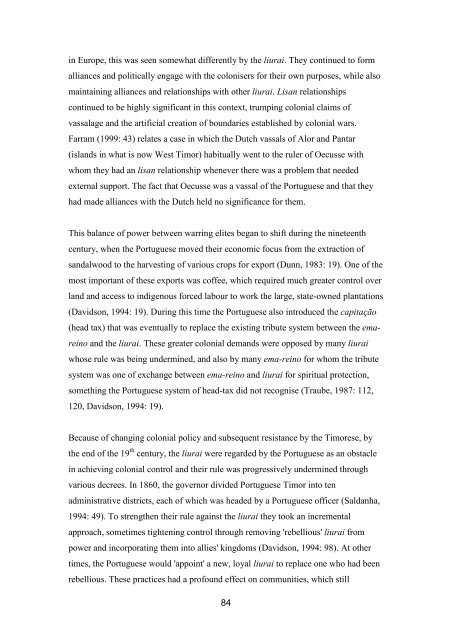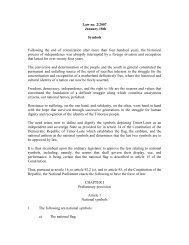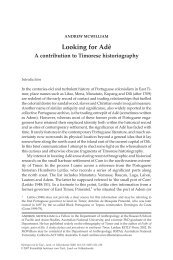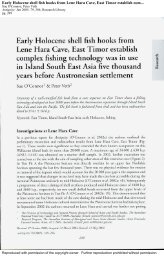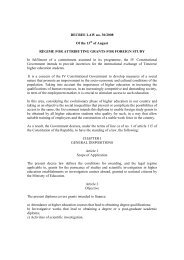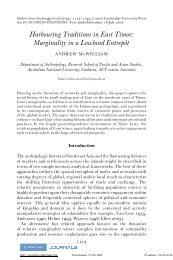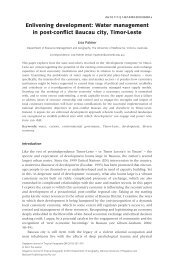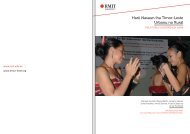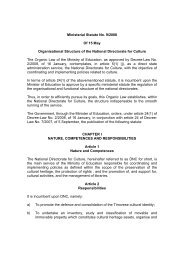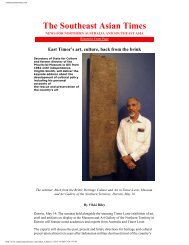Local Governance in Timor-Leste - Secretaria de Estado da Arte e ...
Local Governance in Timor-Leste - Secretaria de Estado da Arte e ...
Local Governance in Timor-Leste - Secretaria de Estado da Arte e ...
- No tags were found...
Create successful ePaper yourself
Turn your PDF publications into a flip-book with our unique Google optimized e-Paper software.
<strong>in</strong> Europe, this was seen somewhat differently by the liurai. They cont<strong>in</strong>ued to formalliances and politically engage with the colonisers for their own purposes, while alsoma<strong>in</strong>ta<strong>in</strong><strong>in</strong>g alliances and relationships with other liurai. Lisan relationshipscont<strong>in</strong>ued to be highly significant <strong>in</strong> this context, trump<strong>in</strong>g colonial claims ofvassalage and the artificial creation of boun<strong>da</strong>ries established by colonial wars.Farram (1999: 43) relates a case <strong>in</strong> which the Dutch vassals of Alor and Pantar(islands <strong>in</strong> what is now West <strong>Timor</strong>) habitually went to the ruler of Oecusse withwhom they had an lisan relationship whenever there was a problem that nee<strong>de</strong><strong>de</strong>xternal support. The fact that Oecusse was a vassal of the Portuguese and that theyhad ma<strong>de</strong> alliances with the Dutch held no significance for them.This balance of power between warr<strong>in</strong>g elites began to shift dur<strong>in</strong>g the n<strong>in</strong>eteenthcentury, when the Portuguese moved their economic focus from the extraction ofsan<strong>da</strong>lwood to the harvest<strong>in</strong>g of various crops for export (Dunn, 1983: 19). One of themost important of these exports was coffee, which required much greater control overland and access to <strong>in</strong>digenous forced labour to work the large, state-owned plantations(Davidson, 1994: 19). Dur<strong>in</strong>g this time the Portuguese also <strong>in</strong>troduced the capitação(head tax) that was eventually to replace the exist<strong>in</strong>g tribute system between the emare<strong>in</strong>oand the liurai. These greater colonial <strong>de</strong>mands were opposed by many liuraiwhose rule was be<strong>in</strong>g un<strong>de</strong>rm<strong>in</strong>ed, and also by many ema-re<strong>in</strong>o for whom the tributesystem was one of exchange between ema-re<strong>in</strong>o and liurai for spiritual protection,someth<strong>in</strong>g the Portuguese system of head-tax did not recognise (Traube, 1987: 112,120, Davidson, 1994: 19).Because of chang<strong>in</strong>g colonial policy and subsequent resistance by the <strong>Timor</strong>ese, bythe end of the 19 th century, the liurai were regar<strong>de</strong>d by the Portuguese as an obstacle<strong>in</strong> achiev<strong>in</strong>g colonial control and their rule was progressively un<strong>de</strong>rm<strong>in</strong>ed throughvarious <strong>de</strong>crees. In 1860, the governor divi<strong>de</strong>d Portuguese <strong>Timor</strong> <strong>in</strong>to tenadm<strong>in</strong>istrative districts, each of which was hea<strong>de</strong>d by a Portuguese officer (Sal<strong>da</strong>nha,1994: 49). To strengthen their rule aga<strong>in</strong>st the liurai they took an <strong>in</strong>crementalapproach, sometimes tighten<strong>in</strong>g control through remov<strong>in</strong>g 'rebellious' liurai frompower and <strong>in</strong>corporat<strong>in</strong>g them <strong>in</strong>to allies' k<strong>in</strong>gdoms (Davidson, 1994: 98). At othertimes, the Portuguese would 'appo<strong>in</strong>t' a new, loyal liurai to replace one who had beenrebellious. These practices had a profound effect on communities, which still84


